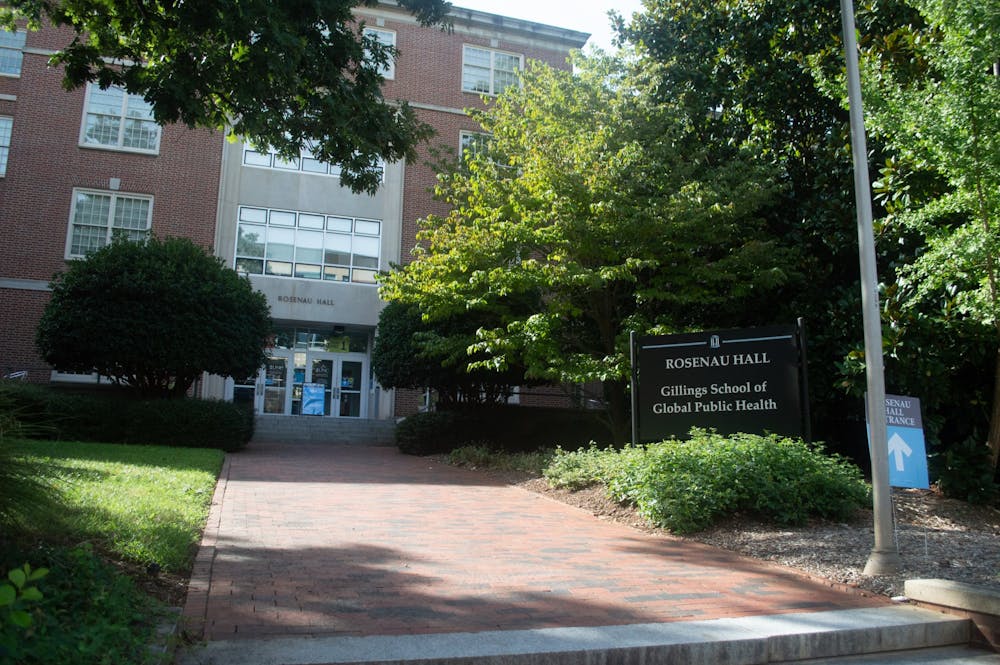The ProPublica article also highlighted a COVID-19 related lab-safety incident at UNC that occurred on April 21. A researcher was bitten by a mouse infected with an adapted version of COVID-19 through protective gear. This researcher was required to self-isolate for 14 days. According to the article, UNC officials declined to answer questions about the incident.
“While UNC’s incident reports say none of the researchers were sickened, the incidents underscore concerns that have been raised for years about the potential for a lab accident to unleash a dangerous virus – natural or manmade – into the surrounding community,” Young said in the email.
In a statement to the DTH, UNC Media Relations said the “potential for harm was minimal and no infection occurred” as a result of the April 21 incident.
Hackers mine for UNC’s vaccine data
A Sep. 5 New York Times article revealed that China utilized digital reconnaissance in an attempt to access COVID-19 vaccine data from UNC.
The article, “Race for Coronavirus Vaccine Pits Spy Against Spy” by Julian E. Barnes and Michael Venutolo-Mantovani, said the hackers from China unsuccessfully attempted to infiltrate the computer networks of UNC’s epidemiology department.
UNC Media Relations told the DTH that the University is seriously assessing the security breaches outlined in the New York Times article and “enhancing our safeguards according to industry standards and best practices.”
Via a Media Relations statement, Dennis Schmidt, assistant vice chancellor and chief information security officer at UNC said, “As part of our commitment to protecting intellectual assets, Carolina has invested in around-the-clock monitoring and threat-hunting services to help guard against advanced persistent threat attacks from state-sponsored organizations.”
UNC’s role in national study
During UNC Health’s weekly media briefing on Sep. 2, Dr. David Wohl, a UNC School of Medicine professor and infectious disease physician, and Dr. William Fischer, an associate professor of medicine and a critical care physician, discussed clinical trials for UNC COVID-19 treatments and vaccines.
Fischer explained that UNC Hospitals is working on therapeutic COVID-19 vaccine trials for inpatients and outpatients.
Wohl said outpatient trials have specifically centered on a subsection of the NIH’s ACTIV, or Accelerating COVID-19 Therapeutic Interventions and Vaccine study, called ACTIV-2. ACTIV-2 allows for multiple coronavirus medicines to be tested at once, Wohl said.
To get the day's news and headlines in your inbox each morning, sign up for our email newsletters.
“This is pretty exciting because this means that we’re not locked into any sort of timetable, and that as promising agents get identified they can enter the study and be compared,” Wohl said.
According to a Sep. 1 website update from the UNC Institute for Global Health and Infectious Diseases, ACTIV-2 is currently assessing the effectiveness of a drug that originated in a blood sample from one of America’s first COVID-19 survivors, and was formatted into a treatment by Lilly Research Laboratories and AbCellera Biologics.
The study, currently a two-phase evaluation, is beginning with 220 participants, according to the UNC Institute for Global Health and Infectious Diseases.
UNC's recent studies
Dr. Ralph Baric, a professor within the Gillings School virology work, helped to create remdesivir, an anti-viral drug now authorized by the U.S. Food and Drug Administration for COVID-19 care, alongside Dr. Timothy Sheahan, another UNC virologist.
In a Q&A with Endeavors, a UNC research-based publication, Sheahan discussed preclinical testing for an antiviral drug similar to remdesivir, called EIDD-2801.
“Unlike remdesivir, which is now an I.V. drug, EIDD-2801 is an oral drug,” Sheahan told Endeavors. “If it proves to be effective and safe, it could be something that you get at the drug store. A widely available antiviral drug taken at the right time in one’s disease course could prevent the development of severe disease and hospitalization and even diminish spread."
EIDD-2801’s preclinical testing has been “promising,” Shehan said, despite being in its early stages.
But testing combinations of vaccines is the most pressing COVID-19 research ongoing at UNC, Sheahan said.
“Ideally, we’d have a treatment regimen that could be given across many days during the first week of symptoms," Sheahan said. "With more effective treatments we can save lives, shorten hospital stays, and maybe even prevent people from going to the hospital in the first place. This would be a huge win for public health.”
@cIaybmorris
university@dailytarheel.com



